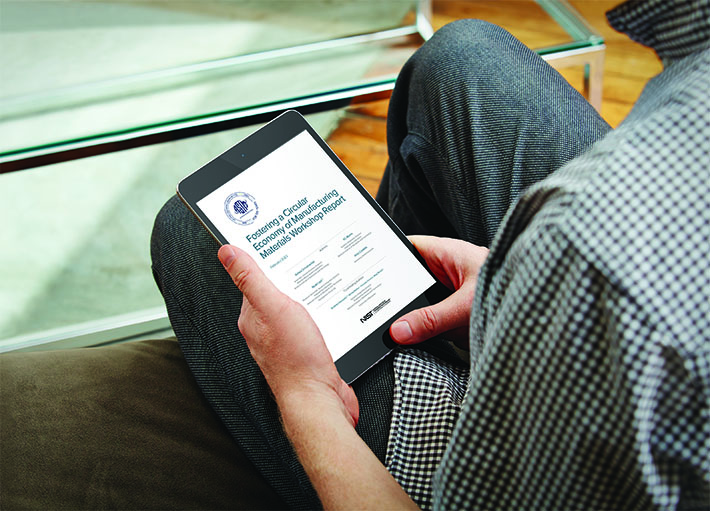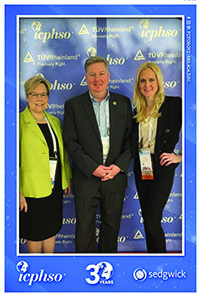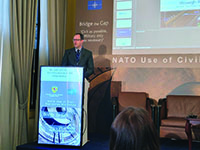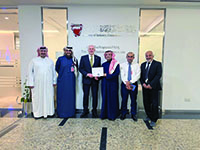
Outreach: Building Relationships
Sustainability Committee Publishes Report on Circular Economy Symposium
The committee on sustainability (E60) held a symposium last April 27-29 titled “Fostering a Circular Economy of Manufacturing Materials.” Stakeholders across the manufacturing sector were invited to identify the standards required to extend the life and enhance the recovery of materials and products through reuse, repair, remanufacturing, and recycling, i.e., a circular economy.
In February 2023, the committee published a report of the same name on the symposium, identifying drivers and barriers that manufacturers face when integrating sustainability and circularity into their operations, as well as the standards needed to overcome these barriers. The committee continues to look for experts within other committees and externally to create these standards and accelerate the transition to a circular economy.
The goal of April’s symposium and of the resulting report was to identify specific standards needed to support a circular economy for manufacturing materials and suggest a path forward to create these standards. Data for this purpose were gathered via a pre-symposium survey and symposium events such as two keynote speakers, 12 plenary speakers, and roundtable discussions among the attendees. The symposium concluded with a discussion of next steps, which resulted in the identification of several categories of standards needs and a roadmap to guide E60 in creating these standards.
The symposium and report identified a path forward for E60 and other committees interested in integrating circularity into their standards. In related work, members of the subcommittee on sustainable manufacturing (E60.13) recently initiated work on a guide for principles for circular product design (WK83603), which describes design principles that product developers can use to take the circular economy into consideration. The committee is looking for people from industry, government, and academia with ideas for additional work items. The committee would also like to collaborate with other ASTM committees interested in harmonizing their standards work with circular economy principles.
Around the world, manufacturers, consumers, governments, and investors are promoting the transition to a circular economy, which will require all hands on deck from a range of stakeholders spanning supply chains and end-of-life materials managers. Standards will be essential to assuring both viability of the new products and materials and recognition of impact reductions made by individual stakeholders. The ISO/TC 323 committee on circular economy is developing foundational and management standards to support this transition, and the EU is integrating the concept into legislation via its “Circular Economy Action Plan” and Green Deal. ASTM has a crucial role to play in creating technical standards to assure that: 1) principles of circularity are agreed upon and followed when developing new products and 2) materials reentering the marketplace are technically fit for purpose.
The committee on sustainability has begun collaboration with other ASTM committees such as the committee on plastics (D20) and the committee on homeland security applications (E54) to provide consistency in standards across a spectrum of materials and products. To this end, a related “Sustainability Roundtable” led by E60 was held in November 2022, with representatives from 23 ASTM subcommittees attending. The committee on sustainability also convenes the U.S. technical advisory group (TAG) to ISO’s circular economy committee to formulate the U.S. position on standardization efforts.
For additional information or to get involved contact E60 committee chair Amy Costello at: AACostello@armstrongceilings.com.
ASTM International Announces Winners of Standards Case Study Contest
ASTM International is celebrating its 125th anniversary this year and as part of the celebrations, the organization has announced eight winners of its Standards Case Study Contest, launched in Spring of 2022.
ASTM technical committees were invited to submit examples of standards that exemplify an above-average impact in bettering society. 74 submissions from 44 different committees were submitted and eight winning case studies were selected.
The winning committees and their case studies include:
Petroleum products, liquid fuels, and lubricants committee (D02)
The specification (D6751) prescribes the required properties of diesel fuels at the time and place of delivery.
Soil and rock committee (D18)
Two test methods that cover laboratory compaction methods used to determine the relationship between molding water content and dry unit weight of soils using standard effort (D698) and modified effort (D1557).
Plastics committee (D20)
Test methods (D6866) teach how to experimentally measure biobased carbon content of solids, liquids, and gaseous samples using radiocarbon analysis. A specification (D6400) covers the requirements for labeling materials and products, including packaging made from plastics as compostable in aerobic municipal and industrial composting facilities. Finally, a specification (D6868) is intended to establish the requirements for labeling of end items that use plastics or polymers as coatings or binders as composable in aerobic municipal and industrial composting facilities.
Vehicle – pavement systems committee (E17)
This guide (E3266) is used to ensure that aircraft braking action reports (ABAR) created by automated systems meet a minimum level of quality and represent a standardized set of assumptions.
Pesticides, antimicrobials, and alternative control agents committee (E35)
This practice (E1053) is used to determine the effectiveness of
liquid, aerosols/foams, and trigger-spray products against designated prototype viruses.
Consumer products committee (F15)
This consumer safety specification (F1169) establishes performance requirements and test procedures to determine the structural integrity of full-sized cribs, in order to attempt to minimize the risk of injury or death.
Personal protective clothing and equipment committee (F23)
This specification (F3502) was the first ASTM standard to address barrier face coverings and was developed in response to the global COVID-19 pandemic.
Amusements rides and devices committee (F24)
The practice (F770) provides guidelines for operations, maintenance, and inspection procedures for amusement rides and devices, to be performed by the owner/operator.
Follow ASTM International’s social media channels to learn more about the case study contest and FOLLOW ASTM’s 125th Anniversary celebrations.
Other News

Left to right) Kathie Morgan, president, ASTM; Len Morrissey, director, global business development and strategy, ASTM; and Molly Lynyak, staff manager, ASTM, attended the International Consumer Product Health & Safety Organization Conference, which included events celebrating the 30th anniversary of ICPHSO. On Feb. 21, Morgan gave a lunchtime keynote address, in which she reflected on the past and embraced the future of product safety standards.

On Feb. 8, Jeff Grove, ASTM’s vice president of global policy and communications, presented ASTM’s global approach to collaboration and innovation at the NATO Use of Civil Standards Workshop, hosted by the Hellenic National Defense in Athens, Greece.

On Feb. 16, Nick Ecart (third from left), director of international sales, ASTM, presented a 15-year anniversary certificate of the memorandum of understanding with the Bahrain Ministry of Industry and Commerce. The certificate was presented to S. Ali Shubbar Jawad Hasan, director, testing and metrology directorate, at the ministry office in Bahrain.
 SN Home
SN Home Archive
Archive Advertisers
Advertisers Masthead
Masthead RateCard
RateCard Subscribe
Subscribe Email Editor
Email Editor